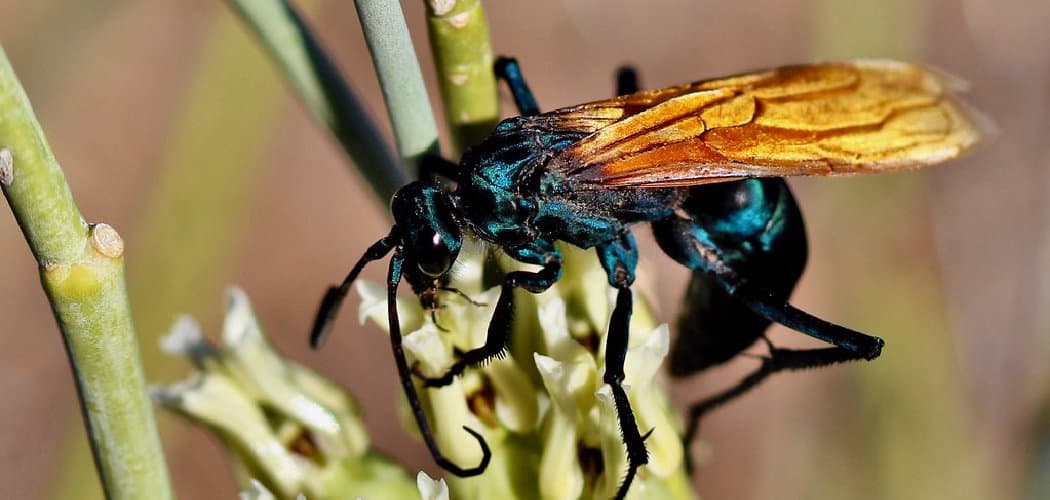The tarantula hawk is a predatory wasp found throughout the Americas. Despite its fearsome appearance, this solitary creature is known for its gentle nature. In fact, the tarantula hawk has a deep spiritual meaning for many people.
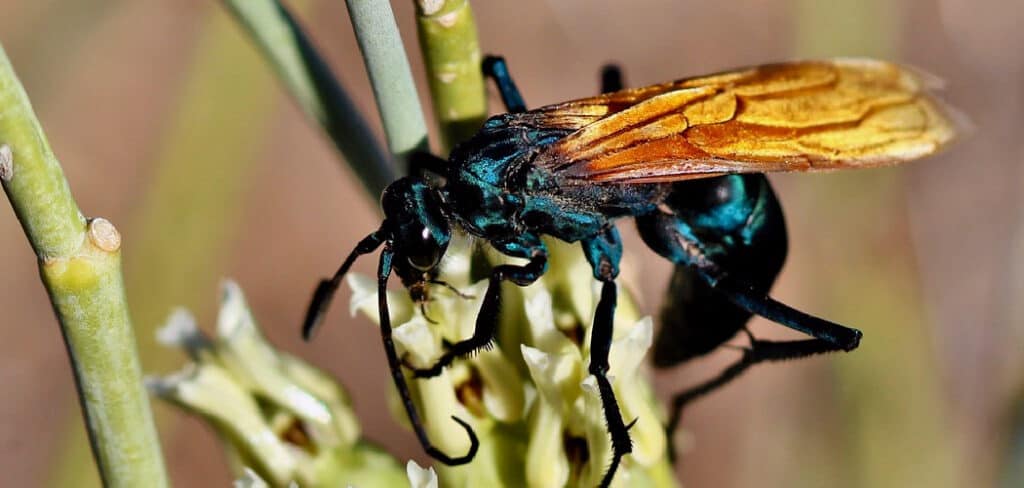
This article will explore the spiritual significance of the tarantula hawk and how it can help you connect with your inner power. So keep reading to learn more about the tarantula hawk spiritual meaning.
Tarantula Hawk Symbolism and Meaning
Tarantula Hawk Native American Symbolism
The Tarantula Hawk is a large wasp that is native to the southwestern United States. These wasps are most commonly seen in the desert, where they prey on tarantulas.
The Tarantula Hawk is considered one of North America’s most dangerous insects, and its sting is said to be agonizing. Despite this, the Tarantula Hawk is also considered to be a symbol of strength and courage by many Native American tribes.
The wasp’s ability to take down such a large and dangerous prey is seen as a metaphor for overcoming difficulties in life. The Tarantula Hawk is also admired for its beauty, with its iridescent wings and bright colors. For these reasons, the Tarantula Hawk is a powerful symbol of Native American culture.
Tarantula Hawk Eastern Symbolism
The Tarantula Hawk is a large wasp found in the eastern United States. The insect gets its name from its habit of preying on tarantulas, which it paralyzes with its sting before dragging them back to its burrow. The Tarantula Hawk is also the official state insect of New Mexico.
The wasp has long been revered by Native Americans, who believe that it has the power to heal the sick and drive away evil spirits. In some tribes, young boys are even given a sting by a Tarantula Hawk as a rite of passage into manhood. Today, the Tarantula Hawk remains an important part of eastern symbolism and folklore.
Tarantula Hawk Christianity Symbolism
Christianity is one of the largest religions in the world, with over 1.2 billion followers worldwide. The symbol of the religion is the cross, which represents the death and resurrection of Jesus Christ. Christianity also has several other symbols, including the tarantula hawk. The tarantula hawk is a large wasp that is native to Central and South America. The wasp preys on tarantulas, and it has a very powerful sting.
The tarantula hawk has become a symbol of Christianity because it represents the power of God. Christians believe that God is all-powerful and can overcome any obstacle, just as the tarantula hawk overcomes its prey. In addition, the tarantula hawk symbolizes the victory of good over evil. Christians believe that, through faith in God, they can overcome any challenge or adversity in their lives. The tarantula hawk is one of many symbols Christians use to represent their beliefs.
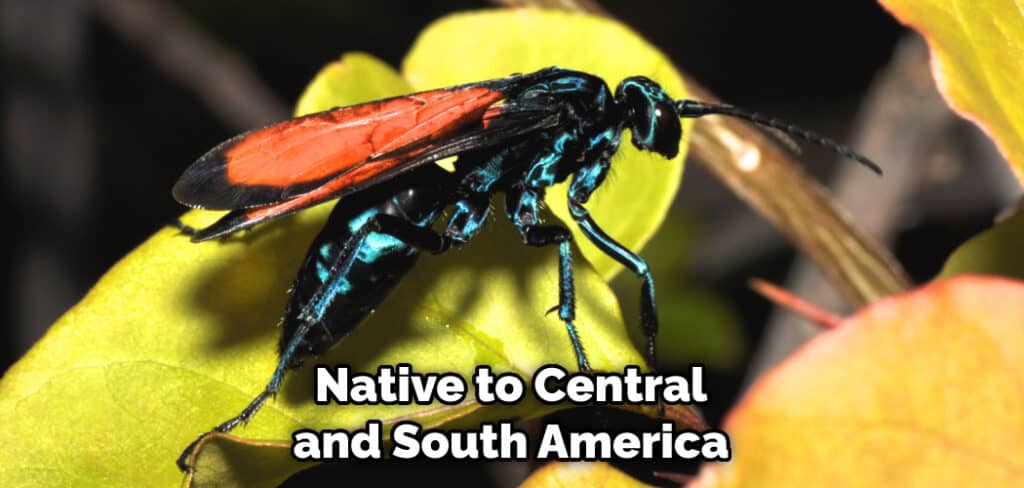
Tarantula Hawk Celtic Symbolism
In ancient Celtic mythology, the tarantula hawk symbolized strength and power. Associated with the God of War, the tarantula hawk was said to bring victory in battle. In addition, the Celts believed that the tarantula hawk possessed the ability to heal wounds and ward off evil spirits.
In some stories, the tarantula hawk is also said to be a symbol of rebirth, as it was believed to have the power to bring the dead back to life. Today, the tarantula hawk is still considered to be a powerful symbol of protection and courage. For many, it is a reminder that hope always remains, even in the darkest times.
Tarantula Hawk African Symbolism
The tarantula hawk is a large wasp found in Africa. It is known for its loud, distinct buzzing noise and its apparently fearless attitude toward humans. Many African cultures also revere the wasp for its hunting prowess and bravery.
In some cultures, the tarantula hawk is seen as a symbol of strength and power; in others, it is considered a helpful guide on the hunt. Regardless of its cultural significance, the tarantula hawk is an impressive creature that can teach us a lot about the natural world.
You Can Check It Out To Natterjack Spiritual Meaning, Symbolism and Totem
Tarantula Hawk Spiritual Meaning
Tarantula hawks are large wasps that are found in dry, desert regions. They are named for their prey, which is the tarantula. The female tarantula hawk will sting the tarantula, paralyzing it.
She then drags the tarantula back to her nest, where she lays her eggs on it. The larvae hatch and feed on the tarantula, eventually killing it. Tarantula hawks are not aggressive toward humans and are actually quite shy. However, their sting is considered one of the world’s most painful stings.
Some Native American tribes believe that the tarantula hawk is a spirit animal that represents strength and courage.
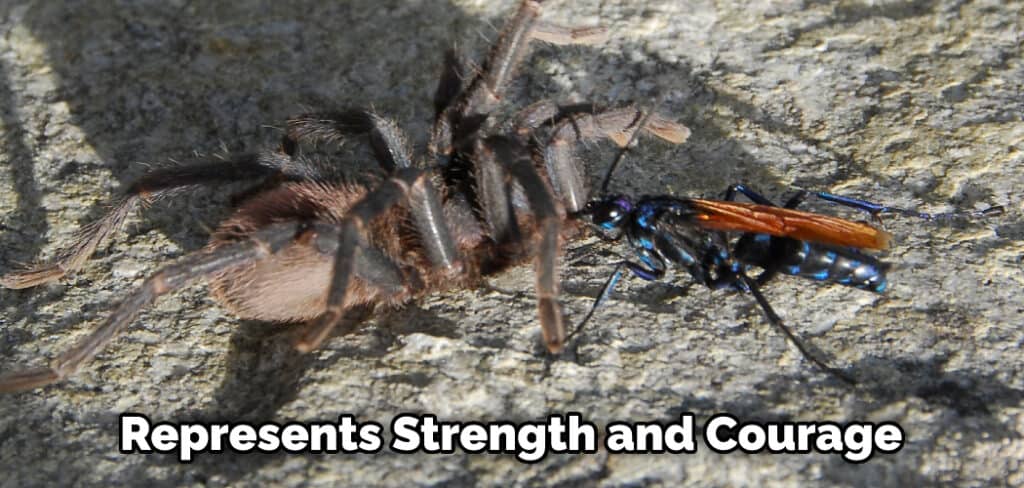
The tarantula hawk is also seen as a symbol of transformation, as the larvae must transform the tarantula into something that sustains them. In some cultures, the tarantula hawk is also seen as a bringer of rain. This is because the larvae need a lot of water to survive, and so they are believed to bring rain when they hatch.
Tarantula Hawk in Dreams
When tarantula hawks feature in our dreams, they can be a symbol of courage and strength. The tarantula hawk is not afraid of anything and will fight tooth and nail to protect what it loves. This same spirit of protection can be called upon when we dream of tarantula hawks. If there is something or someone we need to defend, a tarantula hawk can show us how.
Tarantula hawk energy can also teach us about being fearless in the face of adversity. No matter what life throws our way, the tarantula hawk reminds us that we have the strength to overcome it. So the next time you face a challenge, remember the tarantula hawk and let its courage guide you.
Tarantula Hawk Encounters and Omens
While a tarantula hawk encounter may not be an everyday event, it’s definitely something that can leave a lasting impression. These large wasps are not only brightly colored but also have distinct patterns on their abdomens. In some cultures, tarantula hawk encounters are considered to be good luck, while in others, they’re seen as omens of bad things to come.
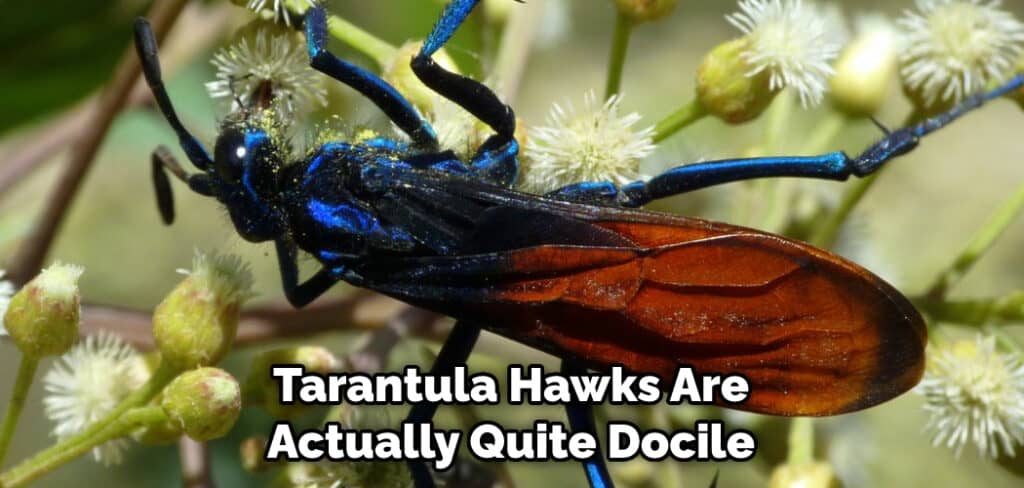
However, there’s no need to be afraid if you do come across one of these interesting insects. Tarantula hawks are actually quite docile and will only sting if they feel threatened. So, the next time you see one of these striking wasps, take a moment to appreciate its beauty – just don’t get too close!
Tarantula Hawk’s Meaning in Mythology and Folklore
The Tarantula Hawk is a large wasp that preys on tarantulas. Native to the American southwest, this wasp is also found in Mexico, Central America, and parts of South America. The Tarantula Hawk gets its name from its preferred prey, the tarantula.
While the tarantula may seem intimidating, the Tarantula Hawk is more than up for the challenge. First, it uses its powerful sting to paralyze the tarantula, then drags it back to its nest, where it will lay its eggs. The larva will then hatch and feed on the living tarantula.
While the Tarantula Hawk may not be the most pleasant creature, it has a certain mystique. The Tarantula Hawk is often seen as a symbol of strength and courage in mythology and folklore. It represents those who are not afraid to take on challenges, no matter how difficult they may be.
In some cultures, the Tarantula Hawk is even seen as a protector, guarding against evil spirits. Whether you see it as a fierce predator or a heroic defender, there is no denying that the Tarantula Hawk is a fascinating creature with a rich history.
Tarantula Hawk Totem Animal
The tarantula hawk is a large wasp that preys on tarantulas. These wasps are found in tropical and subtropical regions, and their sting is said to be one of the most painful of all insect stings. The tarantula hawk totem animal represents strength, courage, and determination. Those who identify with this totem animal are often unafraid of taking risks.
They are also usually quick thinkers and good problem-solvers. Tarantula hawk people are often natural leaders, as they can inspire others to follow them. However, they can also be impulsive and quick-tempered. Those with this totem should learn to control their anger, which can lead to destructive behavior.
Tarantula Hawk Tattoo Meaning
A tarantula hawk tattoo can have various meanings, depending on the individual. For some, it may represent power and strength, while for others, it may be a way to show their affinity for nature and the natural world. However, the most common meaning associated with this tattoo is that of transformation. The tarantula hawk is a unique creature that undergoes a radical transformation during its lifetime.
It starts out as a small, insignificant caterpillar before metamorphosing into a beautiful butterfly. In many ways, this mirrors the journey we all take. We start out as vulnerable and uncertain before gradually discovering who we are and what we are capable of.
As such, a tarantula hawk tattoo can be seen as a symbol of hope and possibility. No matter where we start in life, we always have the potential to emerge as something beautiful and incredible.
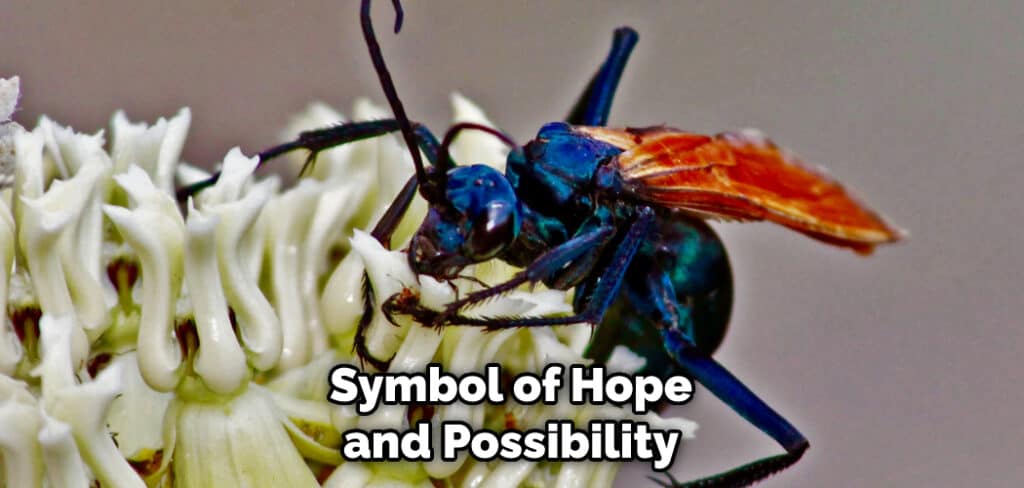
Conclusion
The tarantula hawk is a powerful symbol of strength, courage, and determination. It reminds us that we can overcome any obstacle in our lives if we are brave enough to face it head-on.
This spirit animal also teaches us the importance of staying true to our own path, even when it is difficult. Trust your instincts and have faith in yourself – you have the strength to achieve anything you set your mind to. Thanks for reading our post about the tarantula hawk spiritual meaning.
You Can Check It Out Groundhog Spiritual Meaning, Symbolism, and Totem

